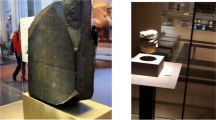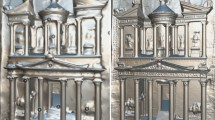Abstract
The design of three-dimensional and four-dimensional Apps, running on the main operating systems Android, iOS and Windows, is the next challenge in Digital Cultural Heritage (DCH) preservation. The enrichment of 3D virtual reality models, derived from computer graphics, computer vision, laser scanning, and aerial and close range photogrammetry by audio and video information acts as an excellent basis for App design.
Based on experiences developing Apps for archaeology and architecture, the paper presents general workflows for data collection, storyboard design and App developments. The 4th dimension, time, can be injected into App content through the use of old photographs, sketches and paintings.
The software package Unity is used as a cross-platform engine, offered by Unity Technologies, to create 3D/4D Apps for PCs, mobile devices and websites. One of the main results of the European Project “4D-CH-World” are two Apps of the Testbed Calw: the App “Calw VR” and the App “Tracing Hermann Hesse in Calw”. Both Apps are using the 3D models created by interactive 3D modeling in Autodesk 3ds Max, with 3D data resulting from airborne LiDAR, terrestrial laser scanning, Structure-from-Motion (SfM) and Dense Image Matching (DIM). The geometric 2.5D reference surface is a LiDAR DSM, further improved by DIM results of georeferenced aerial photography with GSD@20cm.
Access this chapter
Tax calculation will be finalised at checkout
Purchases are for personal use only
Similar content being viewed by others
References
Al-kheder, S., Haddad, N., Fakhoury, L.: A GIS analysis of the impact of modern practices and polices on the urban heritage of Irbid, Jordan. Cities 26(2), 81–92 (2009)
Bathow, C., Breuckmann, B.: High-definition 3D acquisition of archaeological objects: an overview of various challenging projects all over the world. Paper presented at the CIPA Congress, Prague (2011)
Debevec, P.: Modelling and rendering architecture from photographs. Ph.D. thesis, University of California at Berkeley (1996)
Fritsch, D.: 3D building visualization – outdoor and indoor applications. In: Fritsch, D. (ed.) Photogrammetric Week 2003, pp. 281–290. Wichmann, Heidelberg (2003)
Fritsch, D., Becker, S., Rothermel, M.: Modeling facade structures using point clouds from dense image matching. In: Proceedings of International Conference on Advances in Civil, Structural and Mechanical Engineering, pp. 57–64. Inst. Research Engineers and Doctors (2013). ISBN 978981-07-7227-7
Fritsch, D.: Ausgleichungsrechnung damals und heute. In: Baumann, E. (ed.) Johann Gottlieb Friedrich Bohnenberger. Verlag W. Kohlhammer, Stuttgart (2016)
Fritsch, D., Klein, M.: 3D preservation of buildings – reconstructing the past. Multimed. Tools Appl. (2017). https://doi.org/10.1007/s11042-017-4654-5
Kacyra, B.: CyArk 500 – 3D documentation of 500 important cultural heritage sites. In: Fritsch, D. (ed.) Photogrammetric Week 2009, pp. 315–320. Wichmann (2009)
Harrison, L.T.: Introduction to 3D Game Engine Design Using DirectX and C#. Apress, Berkeley (2003)
Hirschmüller, H.: Stereo processing by semi-global matching and mutual information. IEEE Trans. Pattern Anal. Mach. Intell. 30(2), 328–341 (2008)
Tutzauer, P., Klein, M.: The 4D-CH Calw Project – spatio-temporal modelling of photogrammetry and computer graphics. In: Fritsch, D. (ed.) Photogrammetric Week 2015, pp. 207–211. Wichmann & VDE, Berlin & Offenbach (2015)
Zabih, R., Woodfill, J.: Non-parametric local transforms for computing visual correspondence. In: Eklundh, J.-O. (ed.) ECCV 1994. LNCS, vol. 801, pp. 151–158. Springer, Heidelberg (1994). https://doi.org/10.1007/BFb0028345
Acknowledgements
Most of the buildings of the Testbed Calw have been reconstructed by the work of students of the International Master’s Program Geomatics Engineering (GEOENGINE) of the University of Stuttgart. In particular, the work of the following Master’s students is acknowledged, as contribution to the 4D-CH-World project: Ariel Bustamante, Bo Feng, Yuanting Li, Zelong Lian, Aozhi Liu, Abdull Munim, Yiwen Wang, and Ning Zhai.
The 4D-CH-World Consortium is also very grateful to the support of the City of Calw for delivering all information about the city’s development over centuries, and the Landesamt fuer Geoinformation und Landentwicklung, Stuttgart, Baden Wurttemberg for offering topographic data, LiDAR data and building footprints of the Testbed Calw, free of charge. Otherwise, the Testbed Calw could not be realized.
Finally the financial support of the EU Projects “4D-CH-World” and the Marie Curie “ITN DCH” is gratefully acknowledged. Both project teams could collaborate closely and successfully.
Author information
Authors and Affiliations
Corresponding author
Editor information
Editors and Affiliations
Rights and permissions
Copyright information
© 2018 Springer International Publishing AG, part of Springer Nature
About this chapter
Cite this chapter
Fritsch, D., Klein, M. (2018). Design of 3D and 4D Apps for Cultural Heritage Preservation. In: Ioannides, M. (eds) Digital Cultural Heritage. Lecture Notes in Computer Science(), vol 10605. Springer, Cham. https://doi.org/10.1007/978-3-319-75826-8_18
Download citation
DOI: https://doi.org/10.1007/978-3-319-75826-8_18
Published:
Publisher Name: Springer, Cham
Print ISBN: 978-3-319-75825-1
Online ISBN: 978-3-319-75826-8
eBook Packages: Computer ScienceComputer Science (R0)




